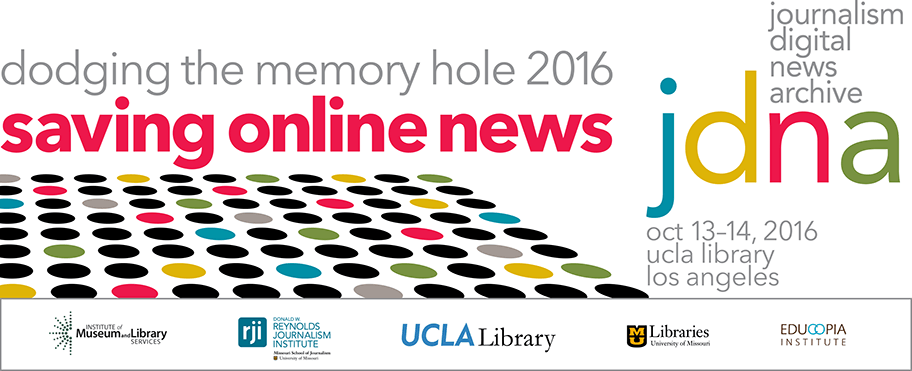
Dodging the Memory Hole 2016: Saving Online News

October 13–14, 2016
Dodging the Memory Hole 2016: Saving Online News, was held at the UCLA Library. It explored preservation and access of content produced by not only traditional media outlets, but also alternative online sources and citizen journalists.
Dodging the Memory Hole 2016: Saving Online News stories
-
Hjalmar Gislason: Keynote speaker: Digital salvage operations — what’s worth saving?
Scroll to view transcript HJALMAR GISLASON: [00:07] So, as Martin said, my name is Hjalmar Gislason, and that’s probably the most complicated part of the presentation. That name comes from Iceland, so that’s where I grew up and that’s where my funny accent comes from, and actually some of the stories I’m going to tell…
-
White paper: Two days dedicated to Dodging the Memory Hole
This white paper summarizes the Dodging the Memory Hole 2016: Saving online news event, with overviews of the panels and presentations, and projects produced by groups at the conference as well as student scholarship recipients. On Oct. 13–14, 2016, University of Missouri Libraries, in collaboration with the Donald W. Reynolds Journalism Institute, UCLA Library and…
-
Michael Nelson: Presentation: Summarizing archival collections using storytelling techniques
Scroll to view transcript MICHAEL NELSON: [00:07] So, what I’m going to be talking about today is Yasmin [AlNoamany’s] Ph.D. work. [00:11] So, if you ask me any difficult questions I’m going to deflect the answer to her; she’s not far away at Berkeley doing a postdoc there. So, what I want to talk about…
-
Jennifer Younger: Lightning rounds: Digital preservation: Aggregated, collaborative, Catholic
Scroll to view transcript JENNIFER YOUNGER: [00:07] Thank you, Ed. It’s great to be here. I’m here on behalf of our many stakeholders, our partners, our members, advisors and, of course, founders. What’s fascinating is our work and our project has been a collaboration right from the beginning. Our partners and stakeholders, they know what…
-
Panel: The future of the past: Modernizing The New York Times archive
Scroll to view transcript EVAN SANDHAUS: [00:08] Thank you for bearing with me while we get the technical things ironed out. I’m Evan Sandhaus, and I am here with my team today to talk about some work we’ve been doing with migrating The New York Times archives. A little bit later, once we say our…
-
Kalev Leetaru: Lightning Rounds: A Look Inside the World’s Largest Initiative to Archive News
Scroll to view transcript KALEV LEETARU: [00:07] Well thank you so much for having me here today. [00:12] So, this is my vision. This is the GDELT Project. The idea of the GDELT Project is, how do we take the world’s information and try to catalog what’s happening around the world, moment by moment, and how are…
-
Katherine Boss: Lightning rounds: Challenges facing preservation of born-digital news applications
Scroll to view transcript KATY BOSS: [00:08] Hi everybody. You guys probably remember me from yesterday, but I'll do quick introductions again. I'm Katy Boss. I'm at the New York University Libraries, librarian for journalism, media culture and communication. My two co-authors on this project are Eva Revear and Meredith Broussard, who you guys heard from earlier in the news apps panel; both are at…
-
Cynthia Joyce: Lightning rounds: Keyword ‘Katrina’: Re-collecting the unsearchable past
Scroll to view transcript CYNTHIA JOYCE: [00:12] This has been a really awesome conference for me to find all the — it’s the right rabbit hole, as I’ve been texting people, for me to fall into, because I had worked on this project a couple of years ago, before I gave any thought to digital archiving, but then it…
-
Terry Britt: Lightning rounds: News archives as cornerstones of collective memory
Scroll to view transcript TERRY BRITT: [00:07] Hello, everyone. When people ask, “What do I do in research?” I usually reply, “A little bit of journalism study, psychology, sociology and just a tiny dash of neuroscience to really make things interesting.” So, what I wanted to do for this conference is to take some of the psychology and sociology…
-
Memory holes and permanent errors: Part 4
The preservation of online news corrections, updates and post-publication edits.

